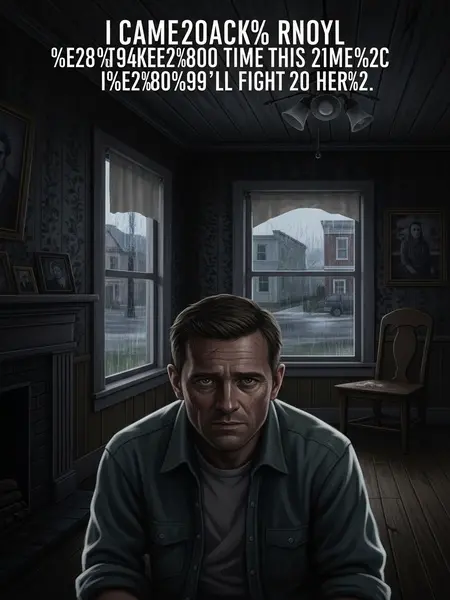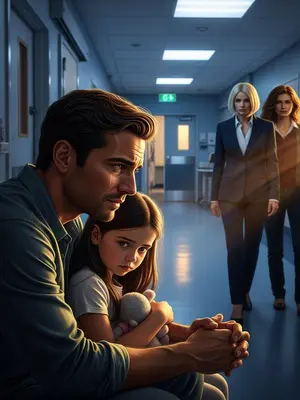Chapter 3: The Mug, the Bruise, the Uprising
When I didn’t say anything, my mom grabbed the old ceramic mug at hand and hurled it straight at my forehead. My four-year-old daughter, seeing this, cried out “Daddy!” and rushed to shield me.
It all happened so fast. The mug sailed through the air, heavy and ugly, and my little girl threw herself between us without thinking. My heart nearly stopped.
The mug smashed into her back, and her little face went instantly pale. I hurried to check if she was okay, but my mom just sneered from the side.
My hands shook as I checked her for bruises. My mom’s sneer burned into me, like she was proud of what she’d done.
“Little money drain. At least she’s got a conscience—knows how to care for her dad. Too bad, though; a drain is still a drain. Sooner or later she’ll get married and leave, no matter how good she is—she’ll be someone else’s problem.”
She spat the words out, like my daughter was nothing but an inconvenience. The cruelty in her voice made my blood boil.
My daughter was tough and brave. She didn’t cry from the blow, but my mom’s words made her tear up.
She bit her lip, fighting back tears, her little hands balled into fists. It hurt to see her so brave, so small and already learning the world could be unfair.
I gently rubbed my daughter’s back where she’d been hit and shielded her behind me, then glared at my mom and said coldly, “Mom, do you even know how to be a parent anymore?”
My voice was steady, but inside, I was trembling. First time I’d ever talked back. Felt weird. Felt good.
“She’s your own granddaughter—how can you say things like that? You’re a woman too. You married into our family from the Harris side. Does that make you a burden?”
I made sure my words landed. I wanted her to hear, really hear, what she was saying.
Maybe she’d never seen me, her usually meek son, talk back like this. My mom’s beady eyes went wide.
She stared at me like I’d grown a second head, her mouth working but no sound coming out for a moment.
“What did you say? Is that how you talk to your mother?”
She dropped to the floor and started wailing. “Your dad died early, I raised you with so much hardship, gave you food and clothes, and this is how you treat your mom?”
Her voice rose to a shriek, the kind that could rattle windows. She rocked back and forth on the floor, playing the part of the wronged mother for all it was worth.
Seeing her pull this act again, I was at a loss. Here we go again. But just then, my wife burst in from outside, crying loudly as she came.
She didn’t hesitate, just stormed in with her voice raised, drawing attention from every corner of the house. I could see the neighbors were already poking their heads in, curious as ever.
“Heavens above! What kind of grandma does this?”
She threw her arms up, her voice cracking with emotion. If there was ever a time for drama, this was it.
“Calling her own granddaughter a money-waster, and throwing a big mug at the kid’s head!”
She didn’t hold back, making sure everyone heard every word. Her anger was righteous, and it filled the room like thunder.
“Oh, my poor girl—are you trying to beat your granddaughter to death?”
She knelt down beside our daughter, fussing over her, making a show of checking for bruises. Her tears were real, but she played it up for the crowd gathering outside.
My wife’s voice was even louder than my mom’s, completely drowning her out. It was lunchtime, and plenty of neighbors were already standing around with their paper plates, watching the commotion from the yard.
The smell of barbecue drifted in from next door, and I could hear someone’s radio playing old country songs. But all eyes were on us, forks paused in midair.
My wife took the chance to pull our daughter outside, lifting her shirt to show everyone her back. “Look at this—her grandma did it. The kid’s only four, and that big mug—she could’ve killed her!”
The bruise was already darkening, and the gasp from the crowd was immediate. Someone dropped their coleslaw, staring in disbelief.
My wife’s move caught me off guard, but it worked. The neighbors crowded closer, all scolding my mom.
There was a low murmur of disapproval, people shaking their heads, some whispering to each other about how things just weren’t right.
“Aunt Carol, that’s way too harsh. The girl’s just four—how could you do that?”
Aunt Linda from next door spoke up, her voice sharp. “Kids are supposed to be spoiled by their grandparents, not bruised.”
“Yeah, even if you spanked her, that’d be better than smashing her with a mug. One slip and you’d have a tragedy on your hands.”
Someone else chimed in, “It’s not right, Carol. That’s not how family treats each other.”
Everyone was talking at once, and my mom, knowing she was in the wrong, didn’t know how to respond. My wife stood to the side, wiping her tears and lamenting her hard life.
She put on a good show, her voice trembling as she talked about all the things she’d endured. The neighbors ate it up, their sympathy clear on their faces.
Finally, someone sharp-eyed asked, “Aunt Carol, what’s with all those bags? You running away from home?”
That did it. The question hung in the air, and everyone turned to look at the pile of bags by the door.
That snapped me back. My mom moving in was the start of all our troubles.
I felt a jolt in my gut. The memories of the last twelve years crashed over me, and I knew I couldn’t let it happen again.
So I echoed, “Yeah, Mom, what’s with the bags? Going to visit someone?”
I kept my tone casual, but my eyes didn’t leave hers. I wanted her to feel the weight of the question.
My mom glanced at her bundles and stammered, “Not visiting, just thought I’d stay at your place for a few days.”
She tried to sound casual. But her eyes darted, looking for backup.
I feigned ignorance. “Stay at our place? Then why so many bags… Wait, Mom, don’t tell me big brother and his wife bullied you, and you don’t want to live with them?”
I made my voice just loud enough for the neighbors to hear, letting the implication hang in the air.
“They hit you or yelled at you? When we divided up the family property, you insisted on living with big brother and gave them all the good stuff. How could they treat you like this? I’ll go have it out with them right now!”
I started toward the door, making a show of rolling up my sleeves, ready to make a scene if I had to.
My mom grabbed me before I could go. “No, no, your brother and his wife treat me fine. I just missed my precious granddaughter and wanted to stay here for a couple days.”
Her grip was tight, her voice suddenly sweet. But I saw the panic flicker in her eyes—she didn’t want the neighbors thinking less of her golden child.
Hearing that, my daughter shrank behind me, scared.
She clung to my leg, peeking out at her grandma, her small body trembling.
Before I could speak, the onlookers were already joking, “Miss your granddaughter? So you show her with a mug?”
Someone snorted, and a ripple of laughter went through the crowd. The tension in the room broke, just a little.
“Yeah, Aunt Carol, we’re all from the same neighborhood, don’t be shy. Did your oldest kick you out?”
It was the sort of teasing that could turn mean if you weren’t careful, but today, it was on our side. I almost smiled.
My mom, desperate to protect my brother’s reputation, quickly denied it. “Of course not, they’re very good to me. I just got tired of staying there and wanted to spend a couple days with my younger son.”
She said it with a forced smile, but nobody seemed convinced.
“What, you can’t visit your kids after splitting up the property?”
The questioners laughed awkwardly, and before I could retort, my wife stepped up, smiling. “All right, two days it is.”
She gave me a quick look, her eyes saying, 'Trust me.'
“Mom, don’t just stand there—come in and sit down. If you want water, help yourself. I’ll go make lunch.”
Her voice was bright, but her smile didn’t reach her eyes. She was playing the part, and I followed her lead.
Seeing there was no more drama, the neighbors ate a few more bites in the yard, then drifted back to their homes.
The crowd thinned, but I could feel their eyes on us, waiting to see what would happen next. Small towns never let anything go unnoticed. Gossip here travels faster than the mail truck.













